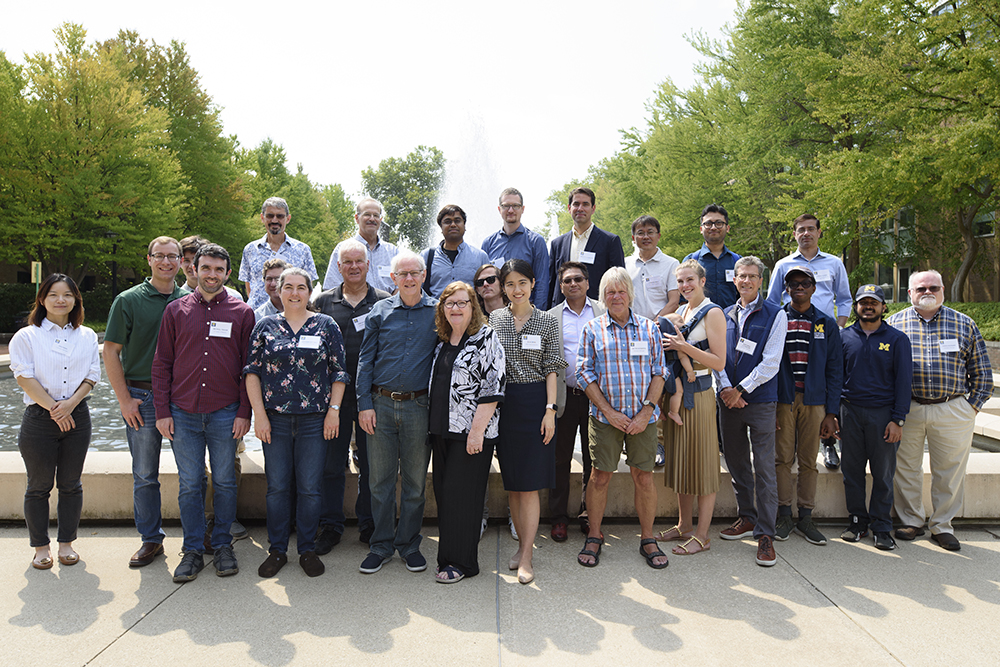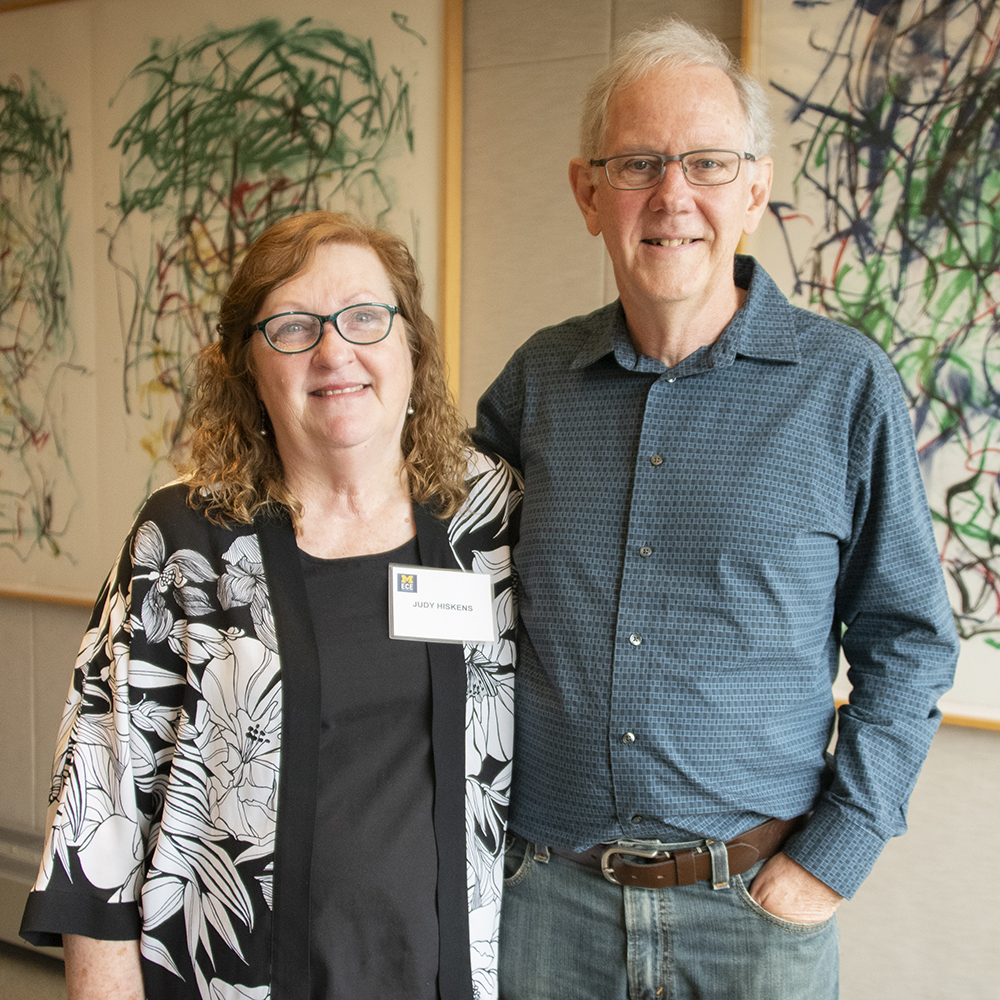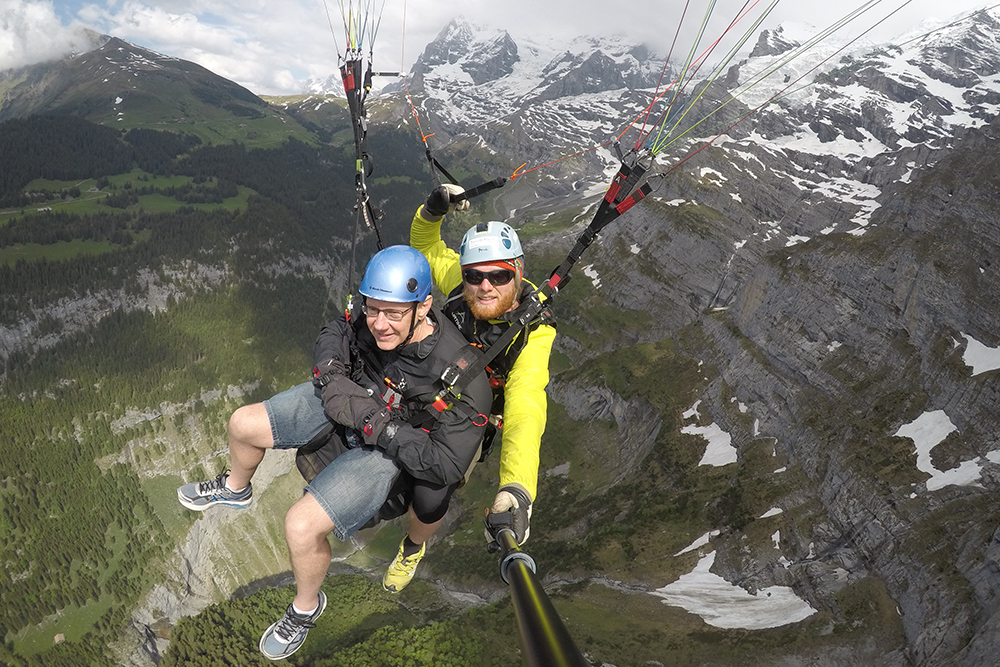Ian Hiskens paraglides into retirement

Ian Hiskens, the Vennema Professor of Engineering, officially retired from the University of Michigan on August 31, 2023, after serving as a faculty member at U-M for 15 years.
“Prof. Hiskens has made important theoretical and practical contributions towards solving humanity’s biggest challenge: the transformation from fossil fuels to sustainable energy sources,” said Prof. Heath Hofmann.
Hiskens is a renowned expert in power system analysis with a special focus on integrating renewable energy sources into the grid. His research interests lie at the intersection of power system analysis and systems theory, in particular modeling, optimization, dynamics and control of large-scale, networked, nonlinear systems.

“Ian energized (pun intended) our own students in ECE to dive into power systems and all of its messy, fascinating nonlinear dynamics,” said Prof. Johanna Mathieu. “He also prioritized teaching the larger campus community core concepts about renewable energy and the challenges of operating modern power grids.”
Hiskens made fundamental contributions in theoretical and practical techniques for assessing voltage collapse, trajectory sensitivity analysis for hybrid dynamical systems, optimal power flow, and algorithms for inverse problems.
“Ian has been an inspiration to me in his approach to and rigor in his research,” said Prof. Al-Thaddeus Avestruz.
Prof. Jim Freudenberg helped recruit Hiskens to the university, specifically so he could lead the development of a power and energy research group.
“There was a big gap in the department between me, a controls person, and someone who’s a circuits person,” Freudenberg said. “But if you add electric power people, there’s no gap anymore. It’s all a solid line.”
Today, the power and energy group is known as the Michigan Power and Energy Lab (MPEL), which includes Mathieu, Hofmann, and Avestruz, as well as a new faculty member, Vladimir Dvorkin, who will begin his term on January 1st, 2024.
“Ian has been an amazing mentor and advocate for me, and also a great friend,” Mathieu said. “He will be missed!”
Ian has been an amazing mentor and advocate for me, and also a great friend.
Prof. Johanna Mathieu
Hiskens earned his Bachelor of Engineering in Electrical Engineering (1980) and Bachelor of Applied Science in Mathematics (1983) from the Capricornia Institute of Advanced Education. He earned his PhD (1991) from The University of Newcastle, Australia.
He worked in transmission operations and planning at the Queensland Electricity Commission for nearly a decade before joining academia as faculty in 1992. He served as a Senior Lecturer at the University of Newcastle before joining the University of Illinois at Urbana-Champaign as a Visiting Associate Professor in 1999. In 2002, he joined the University of Wisconsin-Madison as Associate Professor of Electrical and Computer Engineering, and was promoted to professor in 2005.
In 2008, Hiskens joined the University of Michigan faculty as a professor and was appointed Vennema Professor of Engineering in 2009. He has supervised 24 PhD students and 15 MS students. In addition, he has authored 2 books, 10 book chapters, 86 refereed journal papers, and 180 conference papers.
“The university takes the view that faculty are the best in the world at what they do, so let’s support them as best we can,” Hiskens said. “That’s helped me to be more creative and productive, and that’s been one of the most memorable aspects of being at the University of Michigan.”
A celebration for Hiskens was held on August 21st and featured former students and colleagues who shared personal stories about their time working with him.
“It was my honor and privilege to be guided by him and to have become his final PhD student,” said Sijia Geng (MS ECE, Mathematics ‘21; PhD ECE ‘22). “Ian showed me how to be a candid researcher, a cordial colleague, and a cheerful friend. I’m proud and committed to carry forward his legacy and inspire the next generation of researchers.”
Ian showed me how to be a candid researcher, a cordial colleague, and a cheerful friend.
Sijia Geng (MS ECE, Mathematics ‘21; PhD ECE ‘22)
Freudenberg remembers that the first time he met Hiskens, Hiskens had a sign on his office door from a recent Qantas Airlines flight, which read, “Wake me for meals.”
“He’d be standing there in his shorts and t-shirt looking like he’s off to the beach,” Freudenberg said. “He was actually accomplishing quite a lot, but you weren’t supposed to know that.”
In addition to his robust career, Hiskens has a very full personal life and enjoys many adventurous hobbies. He and his wife, Judy, have been married for 42 years and have five children. One of his children, David, earned his bachelor’s and master’s in Electrical Engineering from U-M. David even took a course taught by his father, and the two would race each other to class on their bicycles.
Hiskens goes ice climbing in the Upper Peninsula every year, which is like rock climbing, except on frozen waterfalls. He also enjoys racing sailboats, even though capsizing is not uncommon.
“I can tell you from experience that capsizing hurts, because typically you’ll hit some lump of aluminum on the way into the water, and that leaves a few bruises and sometimes blood,” Hiskens said. “But there’s a message there, because even when things are not going well and life is not looking good, that doesn’t mean it’s the end of the story.”
One of his favorite hobbies, however, is paragliding. Paragliding involves running down a steep incline or off a cliff until a wing-shaped parachute fills with air and glides effortlessly hundreds to thousands of feet above the ground. While Hiskens has always paraglided in tandem (meaning strapped to a trained glider), one of his goals for retirement is to gain certification to paraglide solo.

For Hiskens, embracing new experiences and exploring new places helped him adjust to life in a different country and a vastly different climate.
“It’s about adding new features to life, not discarding the old ones,” Hiskens said. “It’s about being willing to adopt new aspects of culture, new ways of doing things, and new ways of thinking about things.”
Hiskens has served on the Editorial Board of Proceedings of the IEEE, as chair of the board of directors of the International Institute for Research and Education in Power System Dynamics (IREP), and as Vice-President Finance of the IEEE Systems Council. He is a Fellow of the IEEE, a Fellow of Engineers Australia, and a Chartered Professional Engineer in Australia. He is also a recipient of the M.A. Sargent Medal from the Electrical College board of Engineers Australia.
 MENU
MENU 
